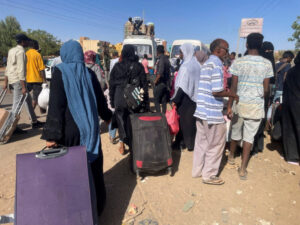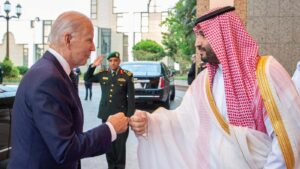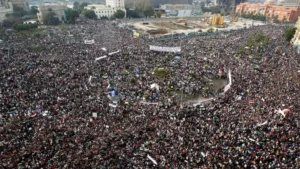
The National Interest Foundation Newsletter
Issue 189, April 28, 2023
Welcome to our NIF Newsletter. In this week’s headlines: we look into the plight of Sudanese civilians as they struggle to escape the fighting, analyze a recent report indicating that Egypt and Saudi Arabia are targeting dissidents living in the United States, and investigate the growing consolidated efforts by dictators in the Middle East to suppress democratic activities.
Written by Breje Khan-Williams; Edited by Jacob Van Veldhuizen
Sudanese Civilians Struggle to Escape

Many civilians are attempting to flee to neighboring countries, overwhelming border crossings. (Photo from Reuters)
Civilians Struggle to Escape Sudan as Fighting Continues
The civil war in Sudan continues to escalate with no end in sight. Many countries are evacuating or have already evacuated their embassy staff. Some have also evacuated many of their citizens from the country. As these evacuations continue, one thing remains glaringly clear, Sudanese civilians are on their own. Many of them, who were already suffering from an unstable economy now have little to no access to food, water, medicine, or electricity. These shortages have so far been centralized in the Sudanese capital of Khartoum, where a majority of the fighting is taking place, but as fighting continues to spread into the surrounding areas, these shortages will likely become an issue across the country.
The fighting started in mid-April when fighting broke out between a Sudanese militia known as the Rapid Support Forces (RSF) and the Sudanese armed forces. They are led by General Mohamad Hamdan Dagalo and Gen Abdel Fattah al-Burhan, respectively. These groups used to work together and there was talk of even merging the two groups into one force. Now these two groups are vying to be the sole leaders of Sudan. So far, hundreds have been killed and thousands injured. Those still trapped in areas where fighting is heaviest are having difficulty escaping, as reliable information is hard to come by. Those who remain in the capital are running out of food, medical supplies, water, and other necessities. There have been reports of people dying in their homes from lack of food and water. Many of the civilians that remain have to face the impossible choice of either remaining and risking starvation or attempting to flee the warzone. Each option is extremely dangerous and lack of information makes this decision infinitely harder.
A concerning trend that has developed is the massive amounts of civilian casualties. Though these are often common, especially in city fighting, the nature of their wounds is what sparks increased concern. According to doctors many of the civilians coming in have been struck by multiple bullets, indicating that they are being purposely targeted. The few remaining hospitals that are open in Khartoum are under a massive amount of pressure, with the same shift of medical personal working for days on end. Shortages have led to the rise of looting and gangs, which add even more danger to an already dangerous situation. The Sudanese people need help, but no one is willing or able to give it at the moment. Much of the aid that makes it into the country is seized by gangs or warring parties. Aid groups have made attempts to adapt their approach, but this will take time. Time that many in Sudan do not have. Refugees that have been able to escape have had difficulty crossing the border into neighboring countries. Even if they are among the lucky that can cross the border, the countries they enter are already overwhelmed with refugees from previous Sudanese conflicts.
It is almost certain the situation in Sudan will continue to worsen in the coming months. There is no offramp for this conflict. The leaders of each side will effectively lose everything, their power, resources, and likely even their lives if the lose this conflict. They are battling for survival and there is no room for negotiations or compromise. Every ceasefire has failed to some extent, with many reporting that fighting continues even when a ceasefire is supposed to be in effect. The epicenter of the fighting is taking place in Khartoum, but the RSF is reported to have taken control of mass swathes of land. Because the fighting is centralized around the place of power, this appears to be a coup attempt by the RSF to seize power from the Sudanese armed forces.
Sudan’s struggle for democracy has been a long and tenuous journey. The removal of Omar al-Bashir, the former despot that ruled over Sudan for decades, gave hope to many in both Sudan and the international community that democracy was possible in the future. Before the civil war broke out, there had been a fragile plan to transfer power from the military to a democratically elected government. This plan was postponed multiple times. Any hopes for this plan have vanished. Sudan and her people now find themselves in a civil war with no end in sight. The international community must keepworking to find solutions to end this conflict as quickly as possible. Neighboring countries must also be given the necessary support to house and care for the refugees that are now pouring in.
Double Standards for Allies

The United States has often criticized countries like China and Russia for targeting dissidents outside of their countries while turning a blind eye to the same behavior by allies like Saudi Arabia and Egypt. (Photo from Reuters)
American Allies in the Middle East have been Targeting Dissidents Living in the United States
Egypt and Saudi Arabia have been accused of targeting dissidents and human rights activists on US soil using a range of tactics, including physical surveillance, hostage-taking, and prosecutions. These allegations were made in a recent report by the Freedom Initiative, a non-profit rights group founded by Egyptian American campaigner Mohamed Soltan. According to the report, both Cairo and Riyadh have become more innovative and emboldened in carrying out transnational repression, which refers to the targeting of opponents overseas. The organization surveyed 72 people for its report, many of whom are American citizens and are part of the Egyptian and Saudi diasporas. The results paint a picture of the two governments’ attempts to intimidate critics and dissidents in the United States.
The report’s findings are deeply concerning, especially considering that these countries are U.S. allies. While American politicians frequently express outrage and impose sanctions in response to such tactics used by rivals like China, Iran, and Russia, policymakers have not effectively held Saudi Arabia and Egypt to account, including for actions that are illegal under U.S. law and pose a threat to national security. It’s worth noting that this is not the first time that Egypt and Saudi Arabia have been accused of such behavior. In 2018, Saudi dissident and contributing columnist to the Washington Post Jamal Khashoggi was brutally murdered and dismembered inside the Saudi Consulate in Istanbul. The CIA concluded that Saudi Crown Prince Mohammed bin Salman was behind the murder, and the Treasury Department levied sanctions on 17 persons it said were engaged under President Donald Trump. However, the report shows that even under the glare of more attention, authoritarian regimes continue to use novel tactics and become emboldened in how they’re carrying out transnational repression. In the case of Egypt, human rights activists and graduate students in Washington claimed that Egyptian operatives have been watching them at eateries and public gatherings. Some respondents said they had been turned down for consular assistance by the Egyptian Embassy. Death threats have been made to several, occasionally by calls posing as Egyptian security personnel.
Egypt has also tried human rights defenders and dissidents in absentia, making it impossible for its American residents to go back home. Additionally, the United Nations declared arbitrarily detained individuals Hossam Khalaf and Salah Soltan, who is the father of Mohamed Soltan, are still being held in prison in Egypt, according to the report. It is forbidden for at least two Americans to leave Egypt. In response to criticism of the administration, officials have “repeatedly” jailed relatives of those who reside abroad. Similar tactics have been used by Saudi Arabia, with American individuals being unjustly arrested or given travel restrictions. Eight respondents stated that members of their family had either been imprisoned by Saudi officials or had vanished. Five people reported receiving threatening phone calls or text messages, and four said they had been physically followed while in the US. The director of the Freedom Initiative, Abdullah Alaoudh, claimed he frequently receives death threats on social media from people he believes are working for the Saudi government. In an interview with The Washington Post, Alaoudh said, “I don’t think they are joking at all,” especially since “they just got away with murder” in the case of Khashoggi. The situation is deeply concerning, especially given the lack of accountability on the part of the U.S. government. In response to Egypt’s and Saudi Arabia’s suppression of dissidents both domestically and internationally, the United States has not significantly altered its policies toward either country. Even after the murder of Khashoggi, Trump continued to have tight connections with Saudi Crown Prince Mohammed and Egyptian President Abdel-Fattah el-Sisi. The Biden administration has taken some steps to distance itself from the Saudi government, but it remains to be seen whether this will translate into meaningful action against transnational repression.
A likely reason for the lack of action against these U.S. allies is the importance of the economic and strategic relationships between these countries. Saudi Arabia is a significant oil producer, and Egypt plays a crucial role in regional security and stability. Nevertheless, human rights should not be sacrificed for the sake of geopolitical interests. Furthermore, transnational repression not only violates human rights but also poses a threat to national security. If foreign governments are allowed to operate with impunity on U.S. soil, it could create a chilling effect on free speech and the ability of Americans to speak out against repression and human rights abuses abroad. It could also embolden other governments to engage in similar behavior. The United States must hold its allies to the same standards it holds its rivals, and not allow authoritarian regimes to operate with impunity on U.S. soil. This can be done through a combination of sanctions, diplomatic pressure, and support for civil society organizations that work to promote human rights and democracy in these countries. The U.S. government needs to take a strong stance against transnational repression, both to protect the rights of its citizens and to promote global democracy and stability.
Authoritarian Leaders Work Together to Suppress Democracy

Dictators in the Middle East are working together to suppress pro-democracy movements. (Photo from Reuters)
Authoritarian Leaders in the Middle East Continue Their Campaign to Bury the Arab Spring
The ongoing efforts by many authoritarian leaders to erase the history of the Arab Spring and undermine democracy in the Middle East is a growing concern. Tunisia, the birthplace of the Arab Spring, managed to transition to democracy, albeit has recently shifted back towards authoritarianism, while Syria remains entrenched in a brutal civil war and authoritarian rule under President Bashar al-Assad. The success of Tunisia’s democratic transition can be attributed to factors such as the presence of civil society groups, a free press, and a willingness to compromise among political factions. In contrast, Syria’s descent into violence and authoritarianism is due to a combination of factors, including the brutal crackdown on peaceful protests, the intervention of foreign powers, and the failure of the international community to intervene effectively.
The increasing cooperation between regimes to maintain their power is a cause for concern. Assad’s dictatorship is benefiting from a steady process of normalization with its Arab neighbors after years of isolation brought on by the horrifying acts of terror Assad unleashed on his nation during a decade-long civil war. With Assad securely in charge and the fighting at a low ebb, nations like Bahrain and the United Arab Emirates have already begun to patch things up with Assad’s government. Saudi Arabia made a significant statement by indicating that it was prepared to do the same, with the Saudi Foreign Minister Prince Faisal bin Farhan al-Saud visiting Damascus, the first high-ranking official from Riyadh to travel there since the uprising in Syria descended into all-out war.
Tunisia, however, was seen as unique. It was one of the first nations to sever ties with Assad, a tyrant who personified the region’s entrenched if deteriorating, authoritarian system. It was at the forefront of the Arab Spring. But the increasingly dictatorial president of Tunisia, Kais Saied, has abruptly put an end to a decade of democratic consolidation. The detention of opposition figure Rachid Ghannouchi this week is just an example of the growing authoritarianism in Tunisia. Ghannouchi had spent decades in exile and years in prison before the 2011 Arab Spring rebellion. After returning to the county, he became a divisive figure. However, he continued to represent the prospect of political plurality in Tunisia, which was unusual for a region more accustomed to the suppression of such aspirations.
Now, Saied’s Tunisia seems on the brink of the bad old order, the latest iteration of what Nadim Houry, executive director of the Paris-based Arab Reform Initiative, described as an “authoritarian restoration” that got underway in the years after the Arab Spring. Houry stated that Saied is pushing through a “striking process of detransition” from democracy.
There was hope that there would be a repeat of the democratization of Tunisia, as protests against the government erupted across the Arab world in 2019, from Algeria to Sudan to Lebanon, Jordan, and Iraq. They were propelled by rage against the failed, incompetent political leaders, the pervasive corruption, and the sluggish economy. Because of the protests, the leaders of states or governments in various nations have resigned. There “was hope that they would move toward more inclusive democracies,” according to Houry. That didn’t take place.
Various Arab states, especially Gulf monarchies in Saudi Arabia and the United Arab Emirates, have helped sponsor the anti-democratic backlash. One such strategy that is often employed is the eraser of the history of the Arab Spring. It’s a sign both of enduring interests – a fear of instability and spillover threats to their monopolies on power at home – as well as the shifting geopolitical sands of the region. Recent Saudi and Emirati move to bury the hatchet with Iran paved the way for the current moves to bring Assad, a close ally of Tehran, out from the cold. “That Saudi Arabia would be spearheading efforts to return Syria to the Arab fold would have once seemed unthinkable,” wrote journalist Sarah Dadouch. The reality is that the authoritarian leaders in the Middle East are not just erasing the history of the Arab Spring, but they are also actively collaborating to maintain their power. The Gulf monarchies, especially Saudi Arabia and the United Arab Emirates, are playing a significant role in sponsoring the anti-democratic backlash.
The international community must continue to pay attention to the ongoing efforts of authoritarian leaders in the Middle East to undermine democracy and human rights. The success of Tunisia in transitioning to democracy, while not perfect, provided an example of what is possible with the presence of civil society groups, a free press, and a willingness to compromise among political factions. On the other hand, the ongoing civil war and authoritarian rule in Syria is a stark reminder of the consequences of brutal crackdowns on peaceful protests, foreign intervention, and the failure of the international community to intervene effectively. Therefore, the international community must continue to support democratic movements and human rights in the Middle East and North Africa. This includes providing aid and assistance to civil society groups, promoting free and independent media, and holding authoritarian leaders accountable for their actions. It also means putting pressure on countries that support anti-democratic regimes to change their behavior.
The ongoing efforts by authoritarian leaders to erase the history of the Arab Spring and maintain their power through collaboration pose a significant threat to democracy and human rights in the Middle East. The success of Tunisia in transitioning to democracy provides hope that change is possible, but it also highlights the challenges that must be overcome. The international community must continue to pay attention to these issues and provide support to democratic movements in the region to ensure that the aspirations of the Arab Spring are not forgotten.
